
Soils and Rocks
Scope & Guideline
Enhancing Understanding of Earth’s Foundations
Introduction
Aims and Scopes
- Geotechnical Engineering and Soil Mechanics:
The core focus of the journal is on Geotechnical Engineering, exploring the mechanical behavior of soils and rocks under various conditions, including loading, environmental influences, and different construction practices. - Numerical and Experimental Analysis:
The journal promotes the use of both numerical simulations and experimental methods to study soil and rock properties, providing a comprehensive understanding of geotechnical phenomena. - Environmental Geotechnics:
Research addressing the interaction between geotechnical engineering and environmental issues, such as pollution and waste management, is a key area, emphasizing sustainable practices in soil and rock use. - Innovative Materials and Techniques:
The journal also highlights studies on new materials (such as geosynthetics and nanomaterials) and innovative techniques for soil stabilization and improvement, contributing to advancements in construction methodologies. - Education and Professional Development:
There is a growing emphasis on educational methodologies and professional development within the field of geotechnical engineering, focusing on improving teaching practices and learning outcomes.
Trending and Emerging
- Sustainable and Eco-Friendly Practices:
A growing emphasis on sustainability is evident in recent publications, focusing on eco-friendly materials and techniques for soil stabilization and construction, which align with global environmental goals. - Advanced Computational Techniques:
There is an increasing trend towards the use of advanced computational methods, including machine learning and artificial intelligence, for soil behavior prediction and geotechnical analysis. - Climate Change Impact Studies:
Research addressing the effects of climate change on soil behavior and geotechnical practices is becoming more prevalent, indicating a response to global environmental challenges. - Smart Geotechnical Engineering:
The integration of digital technologies and smart systems in geotechnical engineering, such as IoT applications for monitoring soil conditions, is emerging as a significant theme in recent publications. - Interdisciplinary Approaches:
There is a notable trend towards interdisciplinary research that combines geotechnical engineering with other fields, such as environmental science and urban planning, to address complex geotechnical challenges.
Declining or Waning
- Traditional Soil Testing Methods:
There has been a noticeable decline in papers focused solely on traditional soil testing methods, as newer technologies and methodologies gain traction in the field. - Static Analysis of Soil Behavior:
Research that primarily relies on static analysis without considering dynamic or real-world conditions appears to be waning, as the focus shifts towards more comprehensive dynamic analyses. - Historical Case Studies:
While historical case studies were once prevalent, there is a decreasing trend in their publication, likely due to the growing preference for innovative experimental approaches and real-time data analysis. - Purely Theoretical Models:
The journal has seen a decline in papers that focus solely on theoretical models without empirical validation, as practical applications and experimental validation become more critical in the field. - General Soil Classification Studies:
Research centered on broad soil classification systems without specific applications or implications is becoming less common, as more targeted and application-oriented studies are favored.
Similar Journals
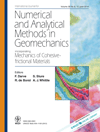
INTERNATIONAL JOURNAL FOR NUMERICAL AND ANALYTICAL METHODS IN GEOMECHANICS
Advancing Geomechanics Through Innovative AnalysisWelcome to the International Journal for Numerical and Analytical Methods in Geomechanics, a prestigious publication dedicated to advancing the fields of geotechnical engineering and computational mechanics. Published by Wiley in the United Kingdom, this journal has been at the forefront of research since its inception in 1977 and continues to provide a vital platform for disseminating innovative methodologies and analytical approaches through 2024. With an impressive impact factor reflecting its excellence, the journal consistently ranks in the Q1 category across multiple domains, including Computational Mechanics, Geotechnical Engineering, and Engineering Geology, making it a key resource for specialists seeking to keep informed on important developments in these areas. Although it does not offer open access, the journal remains highly regarded among researchers and professionals for its rigorous peer-review process and commitment to scientific integrity. As a vital contributor to the field, International Journal for Numerical and Analytical Methods in Geomechanics invites researchers, professionals, and students to explore its comprehensive studies and to advance knowledge at the intersection of numerical analysis and geomechanics.
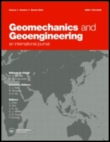
Geomechanics and Geoengineering-An International Journal
Exploring the Foundations of Earth and Engineering SciencesGeomechanics and Geoengineering-An International Journal, published by Taylor & Francis Ltd, serves as a prominent platform for the dissemination of innovative research and advancements in the fields of Geotechnical Engineering and Engineering Geology. With an ISSN of 1748-6025 and E-ISSN of 1748-6033, this journal has established itself as a critical resource within its category, ranking in the Q2 quartile according to the 2023 metrics and positioning itself in the top 38% of the Scopus rankings for Earth and Planetary Sciences. Geomechanics and Geoengineering encompasses a diverse range of topics, including but not limited to soil mechanics, foundation engineering, rock mechanics, and environmental geotechnics, ultimately aiming to advance both theoretical and practical knowledge in these vital areas. This journal not only highlights pioneering research but also facilitates a platform for academia and industry practitioners to collaborate and exchange ideas. While it does not offer open access, it remains a valuable resource for institutions and individuals committed to enhancing their expertise in the geotechnical domain. With convergence years spanning from 2006 to 2024, this journal is equipped to significantly contribute to the evolving landscape of geomechanical research.
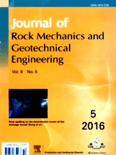
Journal of Rock Mechanics and Geotechnical Engineering
Bridging Theory and Practice in Rock MechanicsThe Journal of Rock Mechanics and Geotechnical Engineering is a premier open-access publication dedicated to advancing the field of geotechnical engineering and engineering geology. Published by SCIENCE PRESS and based in China, this journal has been a vital resource for researchers and professionals since it transitioned to open access in 2013. With ISSN 1674-7755 and E-ISSN 2589-0417, it has established a global reputation, evidenced by its impressive Q1 ranking in the category of Geotechnical Engineering and Engineering Geology as well as a remarkable 8th rank out of 229 in Earth and Planetary Sciences, placing it in the 96th percentile according to Scopus. The journal aims to publish high-quality research that addresses contemporary challenges in the field, offering insightful perspectives and innovative solutions. Researchers, professionals, and students are encouraged to engage with the latest findings and methodologies published within its pages, which span from 2013 to 2024 and continue to pave the way for future advancements in geotechnical practices.

CANADIAN GEOTECHNICAL JOURNAL
Fostering Excellence in Geotechnical Research and CollaborationCanadian Geotechnical Journal, published by Canadian Science Publishing, stands as a premier resource in the field of geotechnical engineering, focusing on the science and practice of soil mechanics, engineering geology, and related disciplines. Established in 1968, this esteemed journal has earned a distinguished reputation, holding a Q1 ranking in both Civil and Structural Engineering as well as Geotechnical Engineering and Engineering Geology as of 2023. It features a rigorous peer-review process that ensures the publication of high-quality research, making it essential reading for researchers, professionals, and students alike. With an impressive Scopus rank of #63 out of 379 in Civil and Structural Engineering and #41 out of 229 in Geotechnical Engineering, the journal continues to contribute significantly to the advancement of knowledge in geotechnics. While the journal does not currently provide open access options, it remains a vital platform for disseminating innovative findings and fostering academic collaboration in the geotechnical community.

International Journal of GEOMATE
Fostering dialogue among scholars and practitioners for a sustainable tomorrow.The International Journal of GEOMATE, published by GEOMATE INT SOC based in Japan, is a pivotal resource for scholars and practitioners in the fields of Building and Construction, Environmental Engineering, Geotechnical Engineering, and Soil Science. Established in 2011 and continuing to set the standard in its focus areas, this journal serves as a platform for innovative research and practical applications, with contributions that significantly enhance the understanding and development of sustainable engineering practices. With its current classification in the Q3 quartile across multiple categories, it strives to disseminate critical knowledge and foster dialogue among a diverse audience, including researchers, industry professionals, and students. Though operating under a traditional subscription model, the journal's emphasis on rigorous peer review and high-quality publications ensures a substantial impact factor, further reinforcing its reputation in academia. Spanning from 2011 to 2024, the International Journal of GEOMATE invites contributions that advance the knowledge frontier and address contemporary challenges in engineering and environmental science.

Geotechnical and Geological Engineering
Innovating Solutions for a Sustainable Geological FutureGeotechnical and Geological Engineering, published by SPRINGER, is a premier journal dedicated to advancing the field of geotechnical and geological engineering. With a strong reputation demonstrated by a robust impact factor and notable Scopus rankings, the journal positions itself in the top quartile of categories such as Architecture and Geotechnical Engineering, making it an essential resource for researchers and practitioners alike. Established in 1991 and continuing through 2024, it provides a platform for original research that addresses the pivotal challenges in soil science, geology, and engineering geology. Although it does not offer open access, it remains accessible through institutional and personal subscriptions, ensuring that academic scholars, industry professionals, and students can engage with high-quality, peer-reviewed content. The journal's commitment to disseminating innovative findings and fostering interdisciplinary dialogue underscores its vital role in shaping future developments in engineering and environmental sustainability.

Rock and Soil Mechanics
Exploring the Foundations of Engineering ExcellenceRock and Soil Mechanics is a premier academic journal published by SCIENCE PRESS focusing on the critical fields of civil and structural engineering, geotechnical engineering, and soil science. With an ISSN of 1000-7598 and transitioning to an Open Access format since 2020, the journal strives to enhance the accessibility of cutting-edge research to a global audience, making significant contributions to practices and methodologies in these crucial disciplines. Ranked in the Q2 category for Civil and Structural Engineering as well as Geotechnical Engineering and Engineering Geology, and Soil Science, it boasts respectable standings in Scopus rankings, further affirming its relevance and credibility within the scientific community. The journal not only serves as a platform for original research but also engages with the latest advances in technology and innovative applications in rock and soil mechanics, proving invaluable for researchers, practitioners, and students alike as they navigate an increasingly complex field of study.
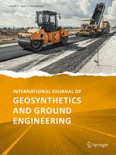
International Journal of Geosynthetics and Ground Engineering
Unlocking the potential of geosynthetics for a sustainable tomorrow.International Journal of Geosynthetics and Ground Engineering, published by SPRINGER INT PUBL AG, stands as a vital resource for the fields of civil engineering and materials science, particularly in the study and application of geosynthetics. With an ISSN of 2199-9260 and E-ISSN 2199-9279, this journal has established itself in the academic community, achieving a commendable position in Q2 category rankings for both Civil and Structural Engineering and Polymers and Plastics as of 2023. It ranks 134th in civil engineering and 77th in polymer science within Scopus, reflecting a respectable impact factor that emphasizes its influence in these disciplines. The journal covers a diverse range of topics, from innovative geosynthetic materials to groundbreaking engineering applications, and aims to foster an environment of collaboration and knowledge dissemination among researchers, professionals, and students. With its scope extending from 2015 to 2024, the International Journal of Geosynthetics and Ground Engineering is committed to pushing the boundaries of research and development in sustainable engineering practices, making it an essential publication for those interested in the future of geosynthetic technology.
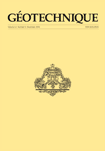
GEOTECHNIQUE
Innovating Geotechnical Engineering for a Sustainable FutureGEOTECHNIQUE is a prestigious peer-reviewed journal published by Emerald Group Publishing Ltd, specializing in the fields of Geotechnical Engineering and Earth and Planetary Sciences. Established in 1948, this journal has consistently delivered groundbreaking research and advancements in the science of soil and rock mechanics, engineering geology, and environmental applications, aiming to foster innovation in geotechnical practices. With an impressive impact factor reflected in its Q1 ranking within both the Earth and Planetary Sciences and Geotechnical Engineering categories, GEOTECHNIQUE is recognized as a leading source of scholarly articles, positioning itself among the top 5% in the field. The journal is accessible via subscription, providing a repository of invaluable insights for researchers, professionals, and students striving to push the boundaries of knowledge and application in geotechnical topics. With a robust editorial board and a commitment to excellence, GEOTECHNIQUE continues to contribute significantly to the academic community and the practical engineering landscape.
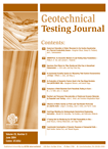
GEOTECHNICAL TESTING JOURNAL
Exploring the Depths of Earth Science and EngineeringGEOTECHNICAL TESTING JOURNAL, published by the American Society for Testing and Materials, is a premier peer-reviewed journal dedicated to the advancement of geotechnical engineering and engineering geology. With an ISSN of 0149-6115 and E-ISSN 1945-7545, this journal has been a cornerstone in the field since its inception in 1978, spanning volumes released until 2024. Ranked in the Q2 category of the 2023 journal metrics, the journal stands as a significant contributor to Earth and Planetary Sciences, particularly in geotechnical applications, as evidenced by its Scopus rank of #102 out of 229, placing it in the 55th percentile across the database. Offering a wealth of empirical research, technical notes, and innovative practice insights, the GEOTECHNICAL TESTING JOURNAL aims to bridge the gap between theory and practical application, making it an invaluable resource for researchers, professionals, and students eager to contribute to and advance the field of geotechnical engineering.